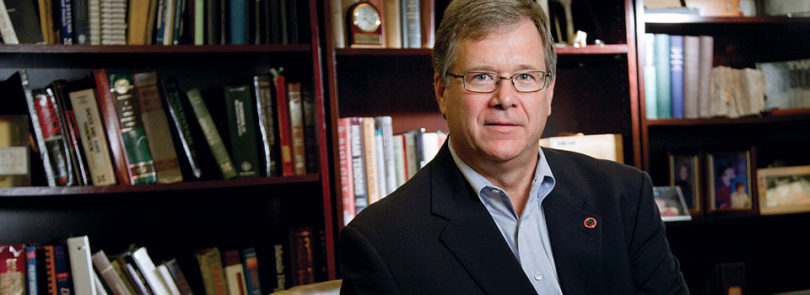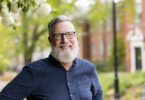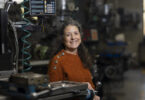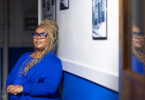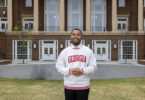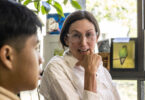Tim Foutz, who has served as director of UGA’s First-Year Odyssey Seminar program since its inception in 2011, also was a founding member of UGA’s Faculty of Engineering and now is a professor in the new College of Engineering.
Where did you earn degrees and what are your current responsibilities at UGA?
I earned my degrees from the College of Engineering at North Carolina State University. My B.S. and M.S. degrees were in Agricultural Engineering with concentrations in environmental engineering; my Ph.D. was in Biological and Agricultural Engineering with a concentration in biomechanics.
Currently, I am a professor in the College of Engineering. My research program focuses on two areas: the biomechanics of the avian musculoskeletal system and the biomechanics of orthopedic therapies used in veterinary medicine. About seven years ago, I became involved in Science, Technology, Engineering and Mathematics (STEM) education reform. The research group uses engineering design methods to determine what faculty think of this reform movement. In addition, I am the director of the First-Year Odyssey Seminar Program.
When did you come to UGA and what brought you here?
I joined the University of Georgia in the fall of 1988. What brought me to UGA? One day, a professor told me about a job announcement that matched to my research background. UGA had an opening for an assistant professor who could teach an engineering course in water management while conducting research in the general area of biological engineering. Since my M.S. thesis was related to assessing the impact of peat mining on Castle-Hayne aquifer and my dissertation was related to investigating the effects of a cancer treatment on the biomechanics of wound healing, I decided to apply. Shifting of my research interest paid off since UGA decided to hire me.
What are your favorite courses and why?
If I had to identify favorite courses, one would be the design methodology course that I taught from 1992 to 2010. This course allowed me to interact, almost daily, with individual students as we discussed alternative and appropriate solutions to a problem. Another one that would be a favorite is a graduate course, Application of Biomechanics, which is for students not majoring in engineering. It gives me the opportunity to examine and discuss an issue from a different perspective than a course for engineering students.
What interests you about your field?
What attracted me to and probably keeps me involved in this research area is the practical aspect of biomechanics and how its principles can be applied to both plants and animals.
What are some highlights of your career at UGA?
From the perspective of my instructional appointment, three things come to mind as highlights: being a UGA Senior Teaching Fellow, being inducted into the university’s Teaching Academy and serving as the director of the First-Year Odyssey Seminar Program. Each of these has allowed me to meet and learn from faculty from all over campus.
Early in my research career, I was one of 30 faculty invited to an NSF-sponsored workshop focused on the topic of engineering design. For my initial work in biological engineering, I have received a Director’s Citation in the area of Emerging Technology from the ASABE and was one of 100 faculty invited to a USDA-sponsored conference focused on the improvement of the competencies of biological engineers. I am a charter member of the Institute of Biological Engineering and a founding member of UGA’s Faculty of Engineering.
How does your research or scholarship inspire your teaching, and vice versa?
For my activities in biomechanics, it is difficult to say which inspired which. Over the years, I learned that integrating research stories into the lecture will take students from the mode of just listening to actively discussing the content of the lecture. For my activities in STEM education, teaching inspires my research since my classroom interactions with students will often expose a research question that I want to explore.
What do you hope students gain from their classroom experience with you?
Whether I am in the classroom lecturing or in my lab discussing the results of an experiment with my graduate student, my aim is to help students consider the possibilities, the benefits and the consequences of their engineered solutions or experimental results. By the end of the semester, if a student does this without my prodding, then I believe I have accomplished my task.
Describe your ideal student.
The ideal student is one who appreciates the opportunity to attend college, who is more focused on gaining an education than getting an “A in class” and who is willing to interrupt a lecture and logically discuss what I am presenting.
Favorite place to be/thing to do on campus is…
I am not sure I have a favorite place. My most favorite thing to do on campus would be standing in the hallway at Driftmier and talking with a student. The conversation, however, is not about the class lecture or assignment; it is typically focused on some non-academic topic.
Beyond the UGA campus, I like to…
Travel with my family, particularly if it is where we can hike together. I also like to go to my grandparent’s farm when my parents, my brothers’ families and extended family are there.
Community/civic involvement includes….
I have served as a member of the parent advisory board for the Athens-Clarke County School District and as a member of various advisory boards at middle schools and high schools. I am involved in teaching Sunday school to children who are at the elementary school age, and I participate in a middle school youth program.
Favorite movie?
I enjoy watching movies like Mr. Blandings Builds His Dream House, Harvey and Airplane.
Proudest moment at UGA?
It is hard to pick a single moment, but one from the early 2000’s comes to mind. At an engineering conference, one of my graduate students was presenting results from her research project. During the Q & A session, a researcher who has an extensive publication record in the area suggested that her results were incorrect. My student took one step forward and challenged his suggestion. The fact that she would not back down is a moment that I will always remember.


